Actor, director and producer Heinz Rühmann (1902-1994) was one of Germany's most popular film stars and played in more than 100 films over nearly 70 years. He was a favourite actor of Adolf Hitler and Josef Goebbels but also of Anne Frank. She pasted his postcard on the wall of her room in her family's hiding place during the war, where it can still be seen today.
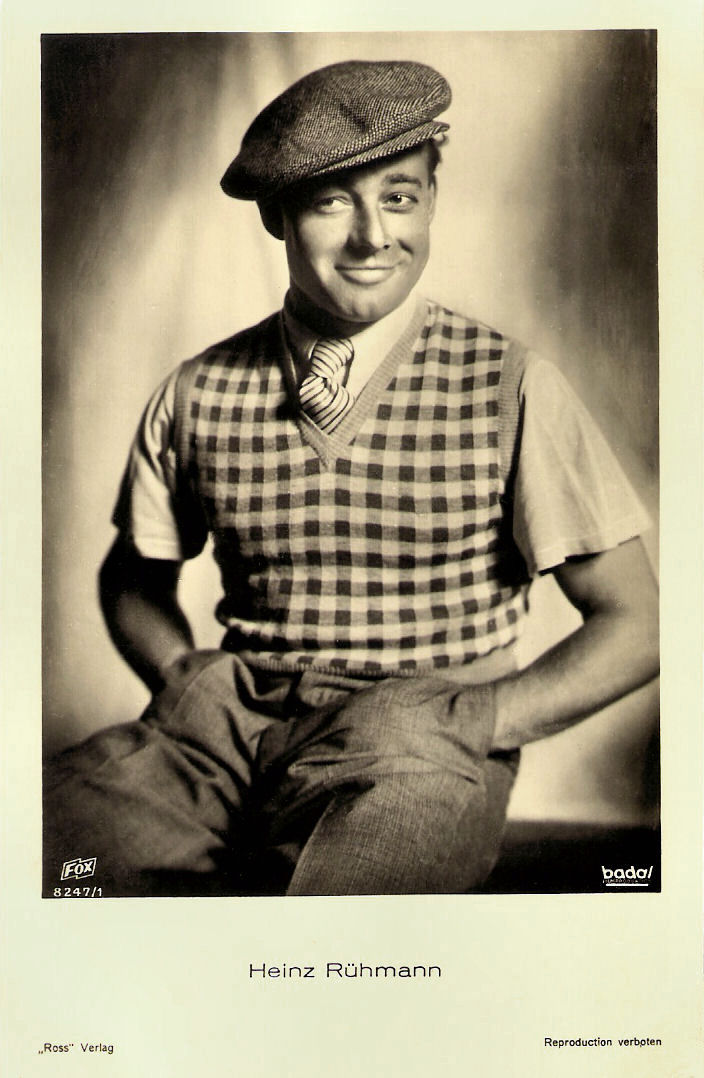
German postcard by Ross-Verlag, no. 8247/1, 1933-1934. Photo: Fox / Badal.
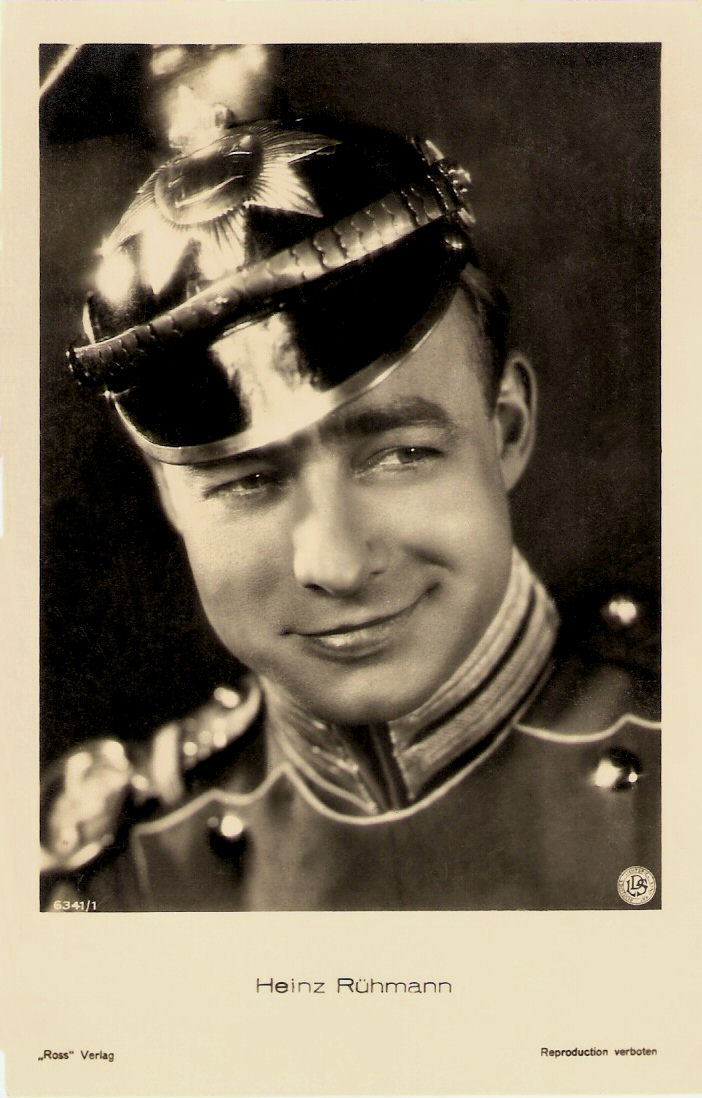
German postcard by Ross Verlag, no. 6341/1, 1931-1932. Photo: Deutsche Lichtspiel-Syndikat (DLS). Publicity photo for the comedy Der Stolz der 3. Kompanie/The Pride of the Third Company (Fred Sauer, 1932).
Heinrich Wilhelm Rühmann was born in Essen, Germany, in 1902. He was born as one of three children (he had two sisters) to Hermann and Margarethe Rühmann. After his parents had divorced in 1916, his father committed suicide.
In 1919 Heinz decided to take acting lessons and six months later he got his first theatre engagement at the Lobe and Thalia theatre.
His first film part was in the silent film Das Deutsche Mutterherz/The German Mother's Heart (Géza von Bolváry, 1926) as a mean son who beats his mother (Margarete Kupfer).
After the introduction of the sound film, Ufa Producer Erich Pommer engaged the young actor for Die Drei von der Tankstelle/Three Good Friends (Wilhelm Thiele, 1930). His cheeky and cheerful role in this successful film operetta at the side of the dream couple Willy Fritsch and Lilian Harvey led to immediate stardom.
Rühmann was signed on by the Ufa and in the following years, he became one of the busiest comedians of the German cinema. His successes included Der Mann, der seinen Mörder sucht/Looking for His Murderer (Robert Siodmak, 1931) and Der Stolz der 3. Kompanie/The Pride of the Third Company (Fred Sauer, 1932).
According to Filmportal.de, Rühmann predominantly played roguish, street-smart characters who get on in their life by small cheatings and cheekiness but meet their fate and all contradictions surrounding it with indifference.
He found ideal complementing film partners in the comedians Theo Lingen and Hans Moser in such films as Meine Frau, die Hochstaplerin/My Wife, the Fraud (Kurt Gerron, 1931), Man braucht kein Geld/No Money Is Needed (Carl Boese, 1932) and 13 Stühle/13 Chairs (E.W. Emo, 1938).
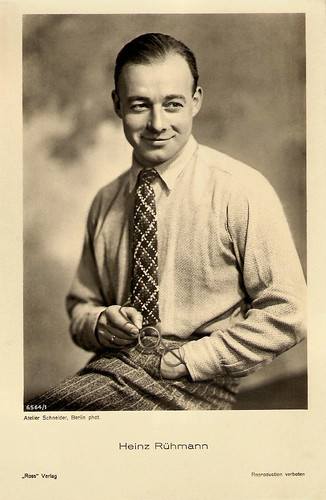
German postcard by Ross Verlag, no. 6564/1, 1931-1932. Photo: Atelier Schneider, Berlin.
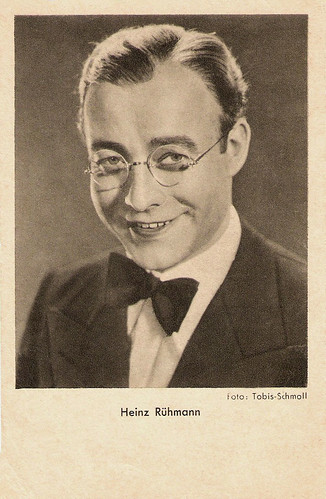
German postcard by Das Programm von Heute, Berkin. Photo: Tobis-Schmoll.
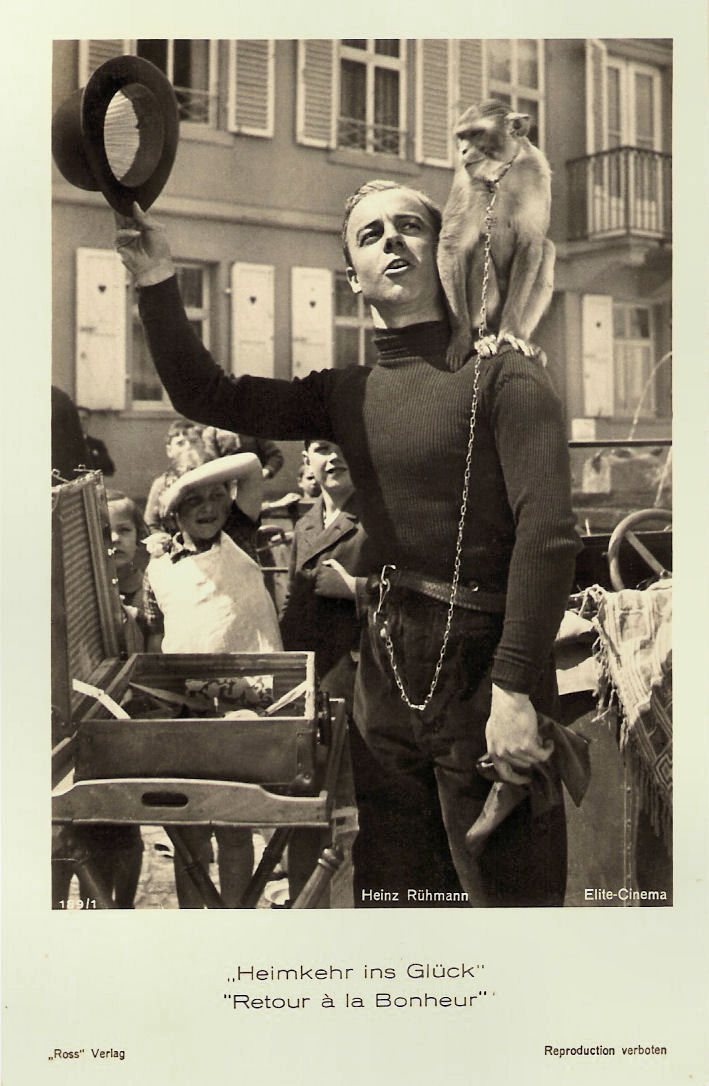
German postcard by Ross-Verlag, no. 189/1. Photo: Elite-Cinema. Publicity still for Heimkehr ins Glück/Return to Happiness (Carl Boese, 1933).
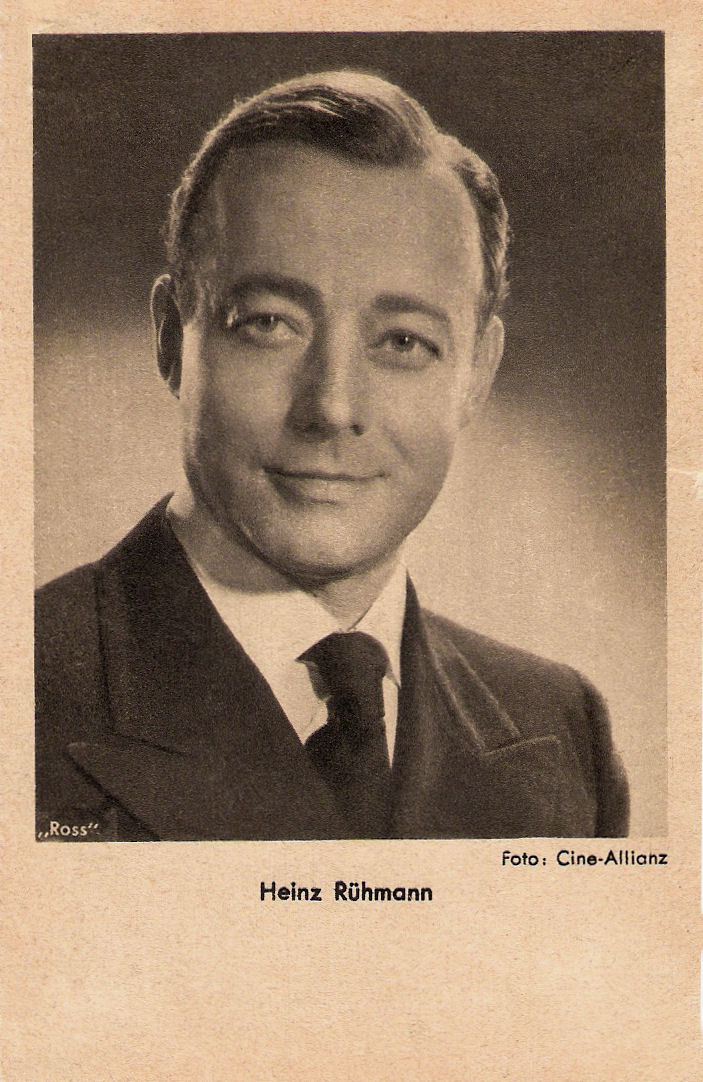
German postcard by Das Programm von Heute, Berlin / Ross Verlag. Photo: Cine-Allianz. Collection: Miss Mertens.
Although Heinz Rühmann never supported the Nazi regime, his career survived – and flourished - only after he divorced his Jewish wife, Maria Bernheim. She married the Swedish actor Rolf von Nauckhoff and thus got the departure permission to Sweden. Rühmann supported her financially during the war and she survived the Holocaust. After the war the couple explained on German television that pressure by the Nazis had forced them to separate.
Two films which marked the height of his career in this period were Der Mustergatte/Model Husband (Wolfgang Liebeneiner, 1937) and Der Mann, der Sherlock Holmes war/The Man Who Was Sherlock Holmes (Karl Hartl, 1937). In the latter he starred as the reserved but smart partner of Hans Albers.
In 1938, he directed his first film Lauter Lügen/Many Lies (1938) starring Hertha Feiler, who later became his second wife. Hertha had a Jewish grandfather, a fact that caused Rühmann again problems with the Nazi cultural authorities. However, he retained his reputation as an apolitical star during the entire Nazi era.
Also from 1938 on, he produced his own films as well as films by other directors with the production company Terra. Among those films were Der Florentiner Hut/The Leghorn Hat (Wolfgang Liebeneiner, 1939), Kleider machen Leute/Fine feathers make fine birds (Helmut Käutner, 1940) and Quax, der Bruchpilot (Kurt Hoffmann, 1941).
From 1938 to 1943 he also played at the Preussische Staatstheater in Berlin and was awarded Staatsschauspieler (National Actor) in 1940.
One of his most popular and best films was Die Feuerzangenbowle/The Fire-Tongs Bowl(Helmut Weiss, 1944), a nostalgic and very funny comedy about mistaken identities. The premiere of Die Feuerzangenbowle was forbidden by the Nazi film censor for 'disrespect for authority', according to Wikipedia. Through his good relationships with the regime, however, Rühmann was able to screen the film in public. He brought the film to the Führerhauptquartier Wolfsschanze for a private screening for Hermann Göring and others. Afterward, Göring was able to get the ban on the film lifted by Adolf Hitler.
He was a favourite actor of both Adolf Hitler and his propaganda minister Joseph Goebbels. In August 1944, Goebbels put Rühmann on the Gottbegnadeten list of indispensable actors and thus was spared having to take part in the war effort. At the end of the war he was forced to witness the rape of his wife Hertha Feiler by Russian soldiers in his Berlin villa.
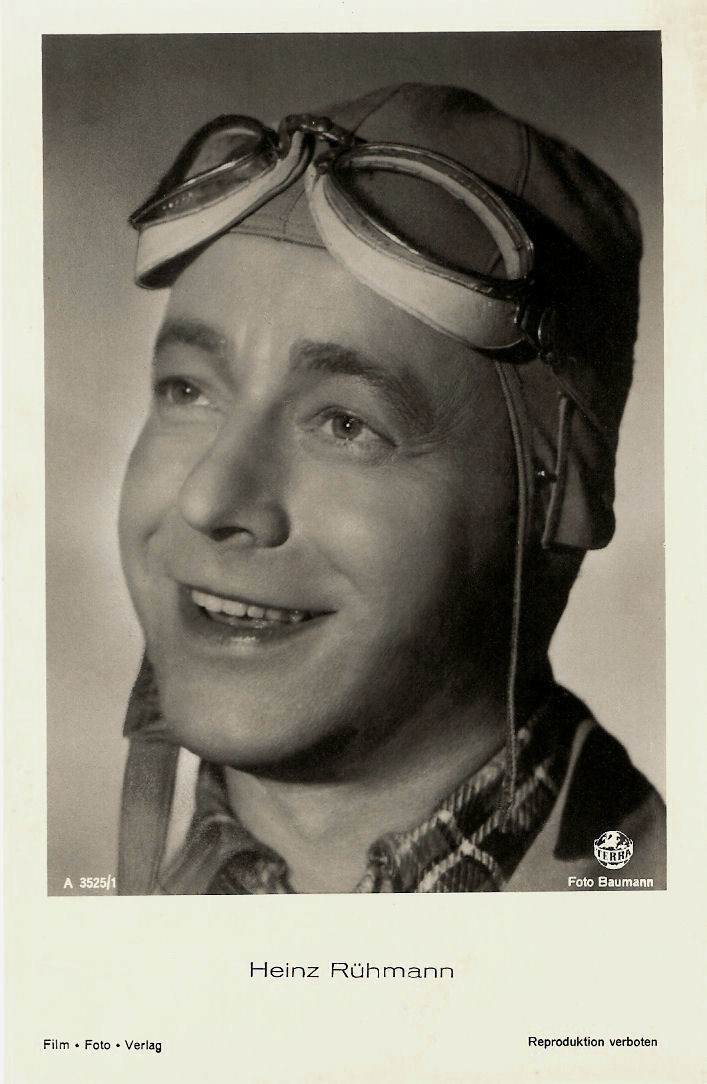
German postcard by Film-Foto-Verlag, no. A 3535/1, 1941-1944. Photo: Baumann / Terra. Probably a publicity still for Quax, der Bruchpilot (Kurt Hoffmann, 1941).
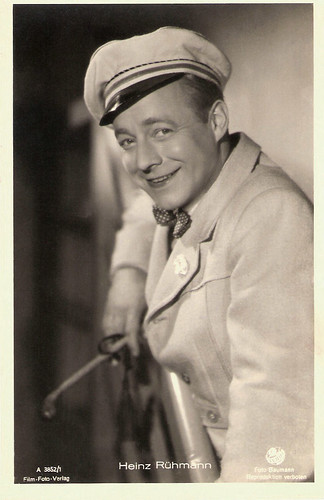
German postcard by Film-Foto-Verlag, no. A 3852/1, 1941-1944. Photo: Baumann / Terra. Heinz Rühmann in Die Feuerzangenbowle/The Punch Bowl (Helmut Weiss, 1944).
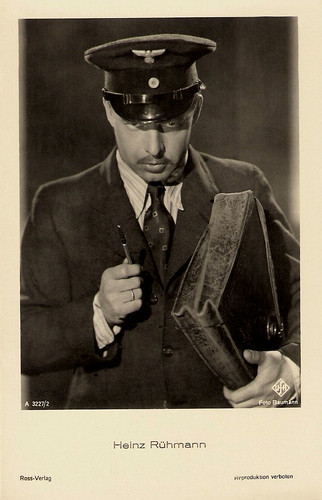
German postcard by Ross Verlag, no. A 3227/2, 1941-1944. Photo: Ufa / Baumann.
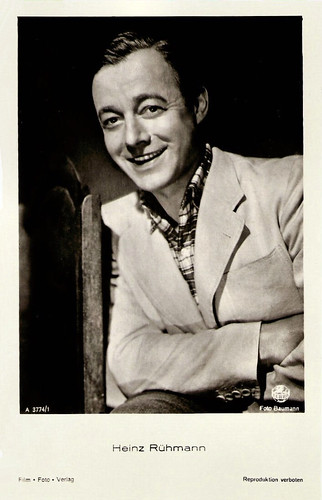
German postcard by Film-Foto-Verlag, no. A 3774/1, 1941-1944. Photo: Baumann / Ufa.
After the Second World War, Heinz Rühmann's career had a tough start. First he was confronted with a working prohibition by the Allies. He toured the part of Germany occupied by the Soviets with his own production of Der Mustergatte/Model Husband and in 1947 he staged the play in Munich and Berlin.
In that year, he also founded the film company Comedia together with Alf Teich. They had a critical success with Berliner Ballade/The Berliner (Robert A. Stemmle, 1948), a satiric look at life in postwar Berlin, but Comedia went bankrupt in 1952.
Producer Gyula Trebitsch helped him get a comeback as an actor with Keine Angst vor grossen Tieren/No Fear for Big Animals (Ulrich Erfurth, 1953) . Subsequently his roles became more and more tragicomic.
He established himself again as a star with the title role of the internationally acclaimed Der Hauptmann von Köpenick/The Captain from Köpenick (Helmut Käutner, 1956). The Oscar-nominated film told the true story of a Prussian cobbler, Wilhelm Voigt, who dressed up as an army officer and took over the town hall in Köpenick. In the days of the German Empire, the army had an almost sacred status, and this cobbler embarrassed army officers and civil servants, who obeyed him without question.
Other big hits were the thriller Es geschah am hellichten Tag/It Happened in Broad Daylight (Ladislao Vajda, 1958) and the satire Der brave Soldat Schwejk/The Good Soldier Schweik (Axel von Ambesser, 1960) based on the novels by Jaroslav Hašek.
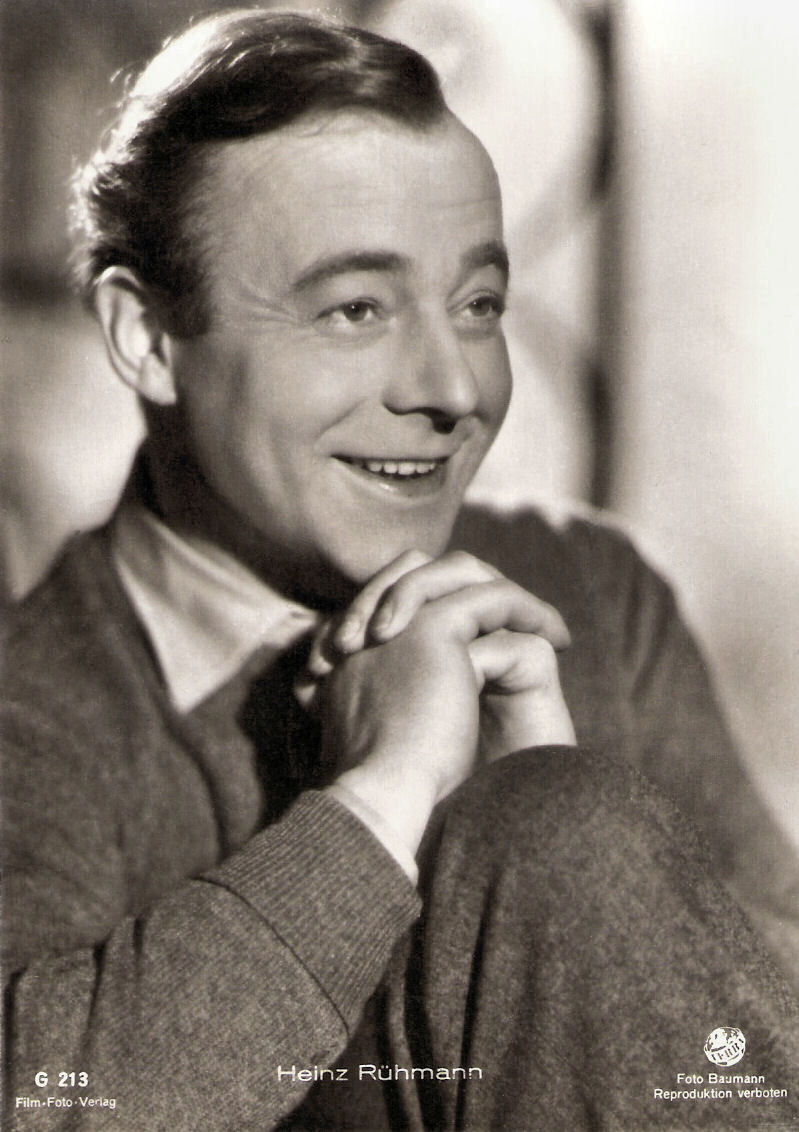
German postcard by Film-Foto-Verlag, no. G 213, 1941-1944. Photo: Baumann / Terra.
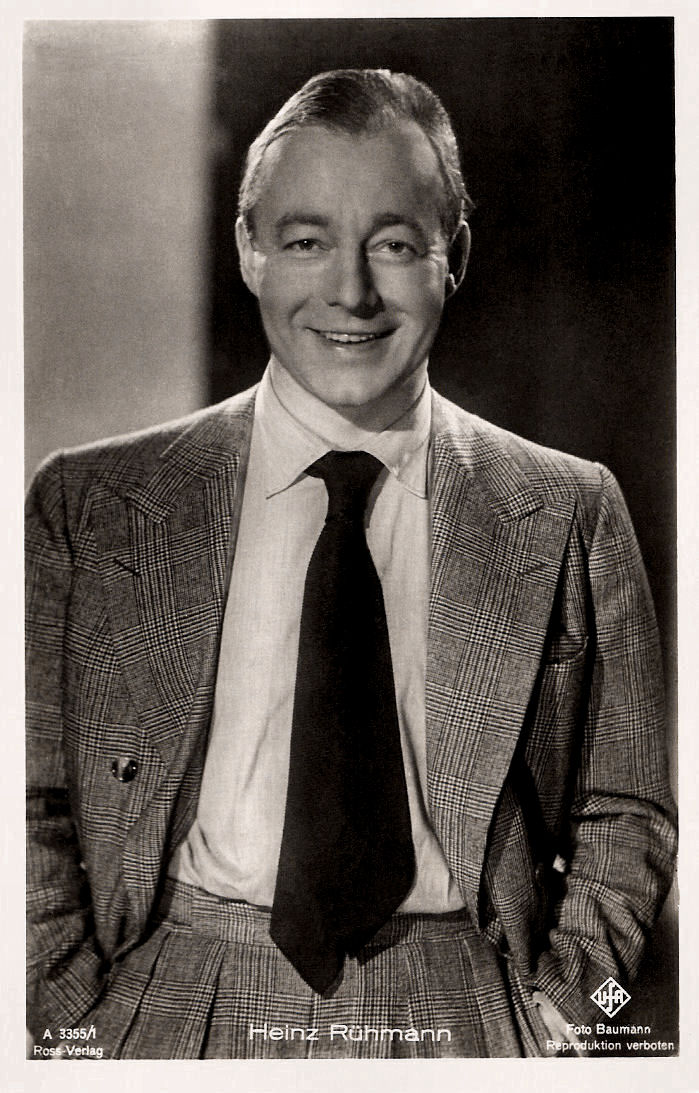
German postcard by Ross-Verlag, no. A 3555, 1941-1944. Photo: Baumann / Ufa.
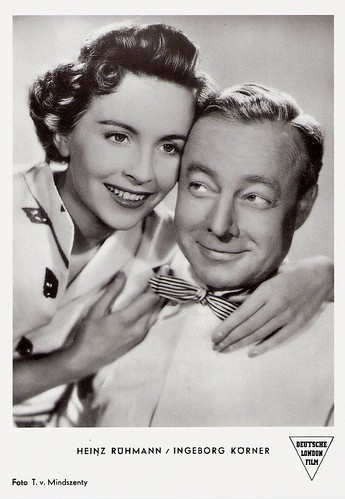
German postcard by K & B / Filmwelt Berlin Archiv für Film-Geschichte, no. 57. Photo: Deutsche London Film / T. von Mindszenty. Publicity still for Keine Angst vor grossen Tieren/No Fear for Big Animals (1953) with Ingeborg Körner.
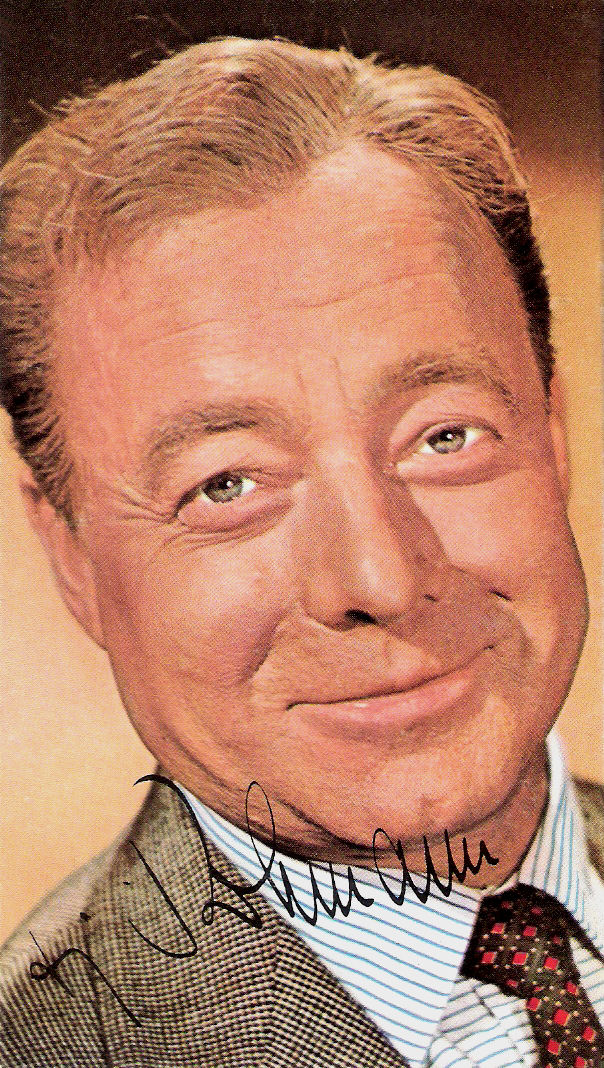
German collectors card by Lux.
Heinz Rühmann played such popular character roles as the title role in Mein Schulfreund/My School Chum (Robert Siodmak, 1960) and as father Brown in Das schwarze Schaf/The Black Sheep (Helmut Ashley, 1960).
He was an ensemble member at the famous Vienna Burgtheater from 1960 to 1962. In Hollywood, he played a supporting role in Ship of Fools (Stanley Kramer, 1965).
From 1968 on, Rühmann mainly worked for TV productions. Twelve times he was voted Germany's most beloved actor and he won a large number of awards.
He also published several books: Heinz Rühmann erzählt vom Geschenk der Weisen und andren Begebenheiten (1978), his memories Das war's (1982) and the photo biography Ein Leben in Bildern (1987).
He gave his farewell performance in In weiter Ferne, so nah!/Faraway, So Close! (Wim Wenders, 1993).
Heinz Rühmann died in 1994 in Aufkirchen, Germany. He was married three times, with Maria Herbot (1924-1938), Hertha Feiler (1939-1970; her death) and Hertha Droemer (1974-1994; his death).
He was the father of Peter Rühmann (mother: Hertha Feiler) and the grandfather of actress Melanie Rühmann.
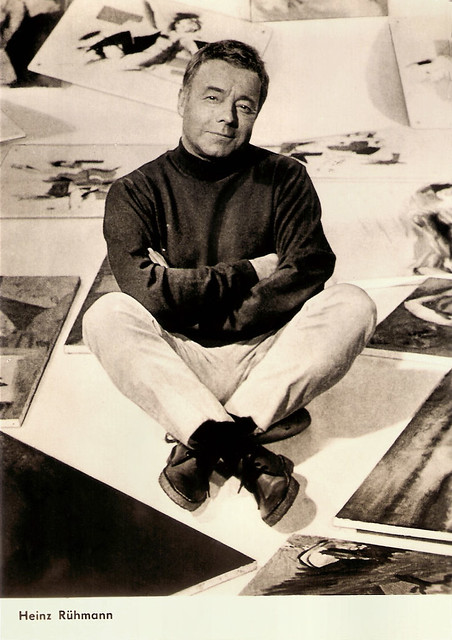
East-German postcard by VEB Progress Film-Vertrieb, Berlin, no. 2642, 1966. Retail price: 0,20 DM. Photo: Progress. Publicity still for Hokuspokus oder: Wie lasse ich meinen Mann verschwinden...?/Hocuspocus (Kurt Hoffmann, 1966).
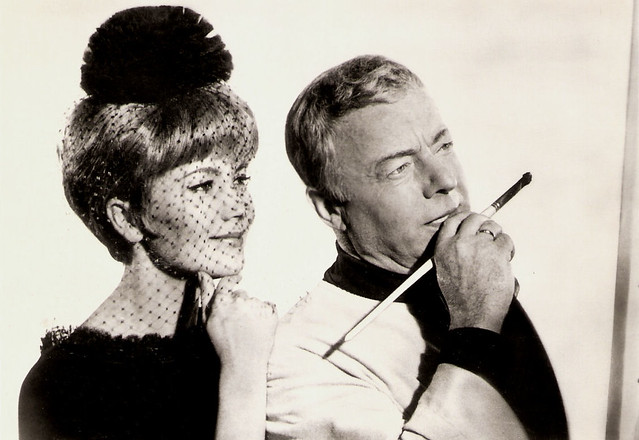
East-German postcard by VEB Progress Film-Vertrieb, Berlin, no. 2662, 1966. Retail price: 0,20 DM. Photo: Progress. Publicity still for Hokuspokus oder: Wie lasse ich meinen Mann verschwinden...?/Hocuspocus (Kurt Hoffmann, 1966).
Sources: Filmportal.de, Thomas Staedeli (Cyranos), IMDb and Wikipedia.

German postcard by Ross-Verlag, no. 8247/1, 1933-1934. Photo: Fox / Badal.

German postcard by Ross Verlag, no. 6341/1, 1931-1932. Photo: Deutsche Lichtspiel-Syndikat (DLS). Publicity photo for the comedy Der Stolz der 3. Kompanie/The Pride of the Third Company (Fred Sauer, 1932).
Mean Son
Heinrich Wilhelm Rühmann was born in Essen, Germany, in 1902. He was born as one of three children (he had two sisters) to Hermann and Margarethe Rühmann. After his parents had divorced in 1916, his father committed suicide.
In 1919 Heinz decided to take acting lessons and six months later he got his first theatre engagement at the Lobe and Thalia theatre.
His first film part was in the silent film Das Deutsche Mutterherz/The German Mother's Heart (Géza von Bolváry, 1926) as a mean son who beats his mother (Margarete Kupfer).
After the introduction of the sound film, Ufa Producer Erich Pommer engaged the young actor for Die Drei von der Tankstelle/Three Good Friends (Wilhelm Thiele, 1930). His cheeky and cheerful role in this successful film operetta at the side of the dream couple Willy Fritsch and Lilian Harvey led to immediate stardom.
Rühmann was signed on by the Ufa and in the following years, he became one of the busiest comedians of the German cinema. His successes included Der Mann, der seinen Mörder sucht/Looking for His Murderer (Robert Siodmak, 1931) and Der Stolz der 3. Kompanie/The Pride of the Third Company (Fred Sauer, 1932).
According to Filmportal.de, Rühmann predominantly played roguish, street-smart characters who get on in their life by small cheatings and cheekiness but meet their fate and all contradictions surrounding it with indifference.
He found ideal complementing film partners in the comedians Theo Lingen and Hans Moser in such films as Meine Frau, die Hochstaplerin/My Wife, the Fraud (Kurt Gerron, 1931), Man braucht kein Geld/No Money Is Needed (Carl Boese, 1932) and 13 Stühle/13 Chairs (E.W. Emo, 1938).

German postcard by Ross Verlag, no. 6564/1, 1931-1932. Photo: Atelier Schneider, Berlin.

German postcard by Das Programm von Heute, Berkin. Photo: Tobis-Schmoll.

German postcard by Ross-Verlag, no. 189/1. Photo: Elite-Cinema. Publicity still for Heimkehr ins Glück/Return to Happiness (Carl Boese, 1933).

German postcard by Das Programm von Heute, Berlin / Ross Verlag. Photo: Cine-Allianz. Collection: Miss Mertens.
Jewish Wife
Although Heinz Rühmann never supported the Nazi regime, his career survived – and flourished - only after he divorced his Jewish wife, Maria Bernheim. She married the Swedish actor Rolf von Nauckhoff and thus got the departure permission to Sweden. Rühmann supported her financially during the war and she survived the Holocaust. After the war the couple explained on German television that pressure by the Nazis had forced them to separate.
Two films which marked the height of his career in this period were Der Mustergatte/Model Husband (Wolfgang Liebeneiner, 1937) and Der Mann, der Sherlock Holmes war/The Man Who Was Sherlock Holmes (Karl Hartl, 1937). In the latter he starred as the reserved but smart partner of Hans Albers.
In 1938, he directed his first film Lauter Lügen/Many Lies (1938) starring Hertha Feiler, who later became his second wife. Hertha had a Jewish grandfather, a fact that caused Rühmann again problems with the Nazi cultural authorities. However, he retained his reputation as an apolitical star during the entire Nazi era.
Also from 1938 on, he produced his own films as well as films by other directors with the production company Terra. Among those films were Der Florentiner Hut/The Leghorn Hat (Wolfgang Liebeneiner, 1939), Kleider machen Leute/Fine feathers make fine birds (Helmut Käutner, 1940) and Quax, der Bruchpilot (Kurt Hoffmann, 1941).
From 1938 to 1943 he also played at the Preussische Staatstheater in Berlin and was awarded Staatsschauspieler (National Actor) in 1940.
One of his most popular and best films was Die Feuerzangenbowle/The Fire-Tongs Bowl(Helmut Weiss, 1944), a nostalgic and very funny comedy about mistaken identities. The premiere of Die Feuerzangenbowle was forbidden by the Nazi film censor for 'disrespect for authority', according to Wikipedia. Through his good relationships with the regime, however, Rühmann was able to screen the film in public. He brought the film to the Führerhauptquartier Wolfsschanze for a private screening for Hermann Göring and others. Afterward, Göring was able to get the ban on the film lifted by Adolf Hitler.
He was a favourite actor of both Adolf Hitler and his propaganda minister Joseph Goebbels. In August 1944, Goebbels put Rühmann on the Gottbegnadeten list of indispensable actors and thus was spared having to take part in the war effort. At the end of the war he was forced to witness the rape of his wife Hertha Feiler by Russian soldiers in his Berlin villa.

German postcard by Film-Foto-Verlag, no. A 3535/1, 1941-1944. Photo: Baumann / Terra. Probably a publicity still for Quax, der Bruchpilot (Kurt Hoffmann, 1941).

German postcard by Film-Foto-Verlag, no. A 3852/1, 1941-1944. Photo: Baumann / Terra. Heinz Rühmann in Die Feuerzangenbowle/The Punch Bowl (Helmut Weiss, 1944).

German postcard by Ross Verlag, no. A 3227/2, 1941-1944. Photo: Ufa / Baumann.

German postcard by Film-Foto-Verlag, no. A 3774/1, 1941-1944. Photo: Baumann / Ufa.
Working Prohibition
After the Second World War, Heinz Rühmann's career had a tough start. First he was confronted with a working prohibition by the Allies. He toured the part of Germany occupied by the Soviets with his own production of Der Mustergatte/Model Husband and in 1947 he staged the play in Munich and Berlin.
In that year, he also founded the film company Comedia together with Alf Teich. They had a critical success with Berliner Ballade/The Berliner (Robert A. Stemmle, 1948), a satiric look at life in postwar Berlin, but Comedia went bankrupt in 1952.
Producer Gyula Trebitsch helped him get a comeback as an actor with Keine Angst vor grossen Tieren/No Fear for Big Animals (Ulrich Erfurth, 1953) . Subsequently his roles became more and more tragicomic.
He established himself again as a star with the title role of the internationally acclaimed Der Hauptmann von Köpenick/The Captain from Köpenick (Helmut Käutner, 1956). The Oscar-nominated film told the true story of a Prussian cobbler, Wilhelm Voigt, who dressed up as an army officer and took over the town hall in Köpenick. In the days of the German Empire, the army had an almost sacred status, and this cobbler embarrassed army officers and civil servants, who obeyed him without question.
Other big hits were the thriller Es geschah am hellichten Tag/It Happened in Broad Daylight (Ladislao Vajda, 1958) and the satire Der brave Soldat Schwejk/The Good Soldier Schweik (Axel von Ambesser, 1960) based on the novels by Jaroslav Hašek.

German postcard by Film-Foto-Verlag, no. G 213, 1941-1944. Photo: Baumann / Terra.

German postcard by Ross-Verlag, no. A 3555, 1941-1944. Photo: Baumann / Ufa.

German postcard by K & B / Filmwelt Berlin Archiv für Film-Geschichte, no. 57. Photo: Deutsche London Film / T. von Mindszenty. Publicity still for Keine Angst vor grossen Tieren/No Fear for Big Animals (1953) with Ingeborg Körner.

German collectors card by Lux.
Germany's Most Beloved Actor
Heinz Rühmann played such popular character roles as the title role in Mein Schulfreund/My School Chum (Robert Siodmak, 1960) and as father Brown in Das schwarze Schaf/The Black Sheep (Helmut Ashley, 1960).
He was an ensemble member at the famous Vienna Burgtheater from 1960 to 1962. In Hollywood, he played a supporting role in Ship of Fools (Stanley Kramer, 1965).
From 1968 on, Rühmann mainly worked for TV productions. Twelve times he was voted Germany's most beloved actor and he won a large number of awards.
He also published several books: Heinz Rühmann erzählt vom Geschenk der Weisen und andren Begebenheiten (1978), his memories Das war's (1982) and the photo biography Ein Leben in Bildern (1987).
He gave his farewell performance in In weiter Ferne, so nah!/Faraway, So Close! (Wim Wenders, 1993).
Heinz Rühmann died in 1994 in Aufkirchen, Germany. He was married three times, with Maria Herbot (1924-1938), Hertha Feiler (1939-1970; her death) and Hertha Droemer (1974-1994; his death).
He was the father of Peter Rühmann (mother: Hertha Feiler) and the grandfather of actress Melanie Rühmann.

East-German postcard by VEB Progress Film-Vertrieb, Berlin, no. 2642, 1966. Retail price: 0,20 DM. Photo: Progress. Publicity still for Hokuspokus oder: Wie lasse ich meinen Mann verschwinden...?/Hocuspocus (Kurt Hoffmann, 1966).

East-German postcard by VEB Progress Film-Vertrieb, Berlin, no. 2662, 1966. Retail price: 0,20 DM. Photo: Progress. Publicity still for Hokuspokus oder: Wie lasse ich meinen Mann verschwinden...?/Hocuspocus (Kurt Hoffmann, 1966).
Sources: Filmportal.de, Thomas Staedeli (Cyranos), IMDb and Wikipedia.
1 comment:
What an amazing life!
Post a Comment